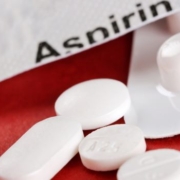The common over-the-counter drug aspirin might be the key to finding a viable treatment method for breast cancer.
Two experimental cancer drugs, one for ovarian cancer and one for a form of breast cancer, received Fast Track designation from the U.S. Food and Drug Administration, which will speed up the regulatory process for these medications.
Daiichi Sankyo and AstraZeneca reported positive topline data from their head-to-head DESTINY-Breast-03 Phase III trial for Enhertu versus trastuzumab emtansine (T-DM1) in patients with HER2 positive metastatic breast cancer.
After an earlier rejection from the U.S. Food and Drug Administration, Merck’s vaunted checkpoint inhibitor Keytruda won approval for the treatment of patients with high-risk, early-stage triple-negative breast cancer.
Pfizer announced a second collaboration agreement with Arvinas to develop and commercialize the Connecticut-based company’s PROTAC estrogen receptor protein degrader.
Topline results from the Phase III TULIP study show an antibody-drug conjugate (ADC) from the Netherlands-based Byondis B.V. significantly prolonged progression-free survival (PFS) in patients with pretreated HER2-positive unresectable locally advanced or metastatic breast cancer (MBC).
As the 2021 American Society of Clinical Oncology (ASCO) Annual Meeting presents many clinical trial updates, there appears to be a theme: access to drugs and pricing.
AstraZeneca Plc’s drug Lynparza reduced the risk of relapse and death in breast cancer patients with certain mutations in a late-stage trial, the British drugmaker said on June 3.
FDA Committee Supports Maintaining Accelerated Approval of Tecentriq in PD-L1+ mTNBC
Accelerated Approval, Blockbusters, Checkpoint Inhibitors, FDA, Genentech, Oncologic Drugs Advisory Committee (ODAC), PD-1/PD-L1 inhibitors, Recommended For Approval, Therapeutics, Triple Negative Breast Cancer (TNBC)A U.S. Food and Drug Administration committee gave the nod to continue using Genentech’s checkpoint inhibitor Tecentriq in combination with chemotherapy to treat adults with unresectable locally advanced or metastatic triple-negative breast cancer (mTNBC) whose tumors express PD-L1.
UK Variant Not as Lethal as Originally Reported
Antibody-Drug Conjugates (ADCs), Breast Cancer, Brown Fat Cells, Cancer Immunology Research, COVID-19 Deaths, COVID-19 Variant B.1.1.7, Covid-19 Variants, Fat Cells, Harvard Medical School, Hospitalized COVID-19 Patients, Immune Cells, Lancet Infectious Diseases, Lancet Public Health, Massachusetts General Hospital, MD Anderson Cancer Center, Osteosarcoma, SARS-CoV-2 virus, Skin Cancer, T-Cells, The Ohio State University Wexner Medical Center, Tumors, WuhanA new study by researchers at the University College London (UCL) published in Lancet Infectious Diseases finds that although the U.K. variant of SARS-CoV-2 known as B.1.1.7 is more transmissible than the wild-type, original Wuhan strain, it is likely not more deadly.










